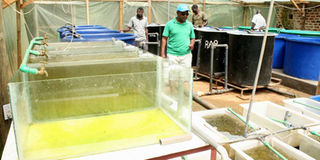Aquaculture curriculum launched to boost tilapia production

A fish farmer inspects fingerlings hatcheries in his farm. An aquaculture curriculum has been released to boost tilapia farming and reduce dependence on lake fishing. FILE PHOTO | NMG
What you need to know:
- The curriculum, which is also backed by the Comprehensive African Agriculture Development Programme seeks to promote competency based hands-on training to enable fish farmers fully benefit from it.
- Dr Mathias Braun, GIZ’s Agriculture Programmes director noted that the initial two-phased Trilateral Tilapia Cooperation, which was running in the country since June 2012 to December 2016 culminated in the development of the curriculum to continue offering insights to fish farmers to sustain their aquaculture activities
- Results have been promising with 50 per cent increased profitability, a drop in ponds’ fish mortality rates, high reinvesting by fish farmers and private farms, increased yields and reduction in ponds’ maintenance and operation costs.
- Fish-farming sub-sector is showing great potential to develop in future.
The national aquaculture curriculum has been launched to promote, boost and sustain farming of tilapia in ponds within Lake Victoria catchment areas and across the country.
The modular curriculum which will be offered in various vocational training institutions, polytechnics and colleges in the country, is a result of efforts to sustain the declining tilapia population in Lake Victoria, promote sustainable ways to protect its environment and eradicate poverty by inspiring deviation into alternate fish-farming methods.
The curriculum which is part of the Trilateral Tilapia Cooperation, is a combined product Kenya’s Ministry of Agriculture, Livestock and Fisheries, the German Development Cooperation Agency, through Deutsche Gesellschaft für Internationale Zusammenarbeit GmbH (GIZ) and Israeli Foreign Affairs Ministry’s Agency for International Development Cooperation.
Speaking during the launch, the programme’s deputy manager, Ladislao Di Domenica said the curriculum, which is also backed by the Comprehensive African Agriculture Development Programme seeks to promote competency based hands-on training to enable fish farmers fully benefit from it.
“This farmers-friendly flexible curriculum, currently runs in institutions such as Ramogi Institute of Advanced Technology and Lake Basin Development Authority in Kisumu among others. It comprises 70 per cent practical hands-on aspects of learning and 30 percent theory and through it, we expect to boost aquaculture to ensure the region’s tilapia output increases,” said Di Domenica.
Dr Mathias Braun, GIZ’s Agriculture Programmes director noted that the initial two-phased Trilateral Tilapia Cooperation, which was running in the country since June 2012 to December 2016 culminated in the development of the curriculum to continue offering insights to fish farmers to sustain their aquaculture activities.
The first phase focused on 10 counties in the Western Kenya region, with the latter phase centering on up-scaling lessons learnt in phase one, and was implemented in Kakamega, Bungoma and Siaya.
“After providing the key knowledge to farmers, it was fair that we give them a means to learn more and develop their fish farming,” said Dr Braun.
He added that thus far, results have been promising with 50 per cent increased profitability, a drop in ponds’ fish mortality rates, high reinvesting by fish farmers and private farms, increased yields and reduction in ponds’ maintenance and operation costs.
He further noted that the curriculum will ensure that knowledge on aquaculture spreads across the country and boosts the fish-farming sub-sector which is showing great potential to develop in future.





